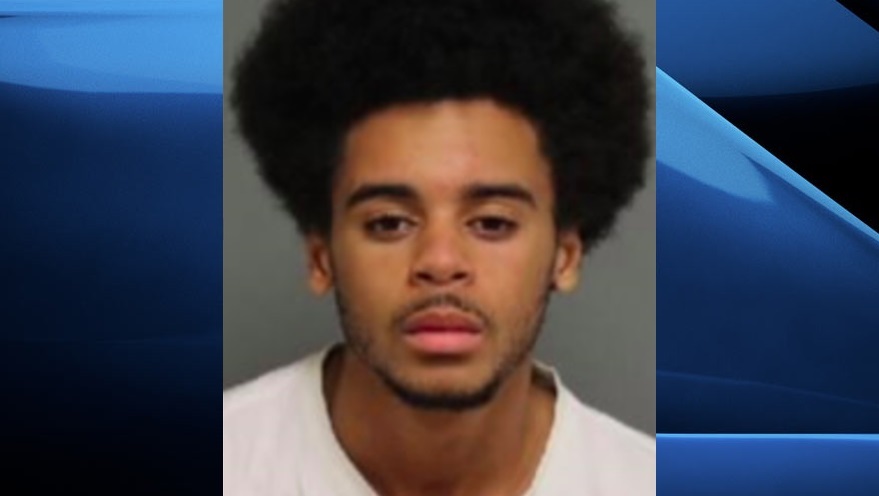Keiron Gregory, the 22-year-old Toronto man wanted for second-degree murder in the death of Bill Horrace — and the son of a Toronto police officer charged with breach of trust in the case — has been arrested and appeared in court on Wednesday, according to London police.

The shooting death has drawn widespread attention due to Horrace’s past in Liberia, including allegations he committed war crimes, however Det. Supt. Chris Newton with the London police told Global News the murder investigation is focusing on “business dealings” in Canada.
Police announced the charge against Gregory, from the North York area of Toronto, on June 25, four days after the home invasion and shooting death in London, Ont., but his whereabouts were unknown until his arrest in North Bay, Ont., nearly three weeks later on July 14.
He appeared in court Wednesday afternoon and remains in police custody in London with his next court appearance scheduled for July 22.
Also charged in connection with the case at this time are Gregory’s 46-year-old father and two 22-year-old women, all of North York.
- 2 teens charged with murder in case of 16-year-old killed outside Halifax mall
- Green Party deputy leader given jail sentence for Fairy Creek old growth protests
- Cars torched, explosions heard in suspected arson in Montreal neighbourhood
- Gas station clerk stabbed several times during violent attack at Ultramar in Montreal
The father, Trevor Gregory, was charged with breach of trust in relation to the June 21 death of Horrace. A Toronto police spokesperson confirmed to Global News on July 9 that Gregory is a detective constable with 21 years of service and that “he has been suspended with pay, as per the Police Services Act.”
Court documents obtained by Global News show the breach of trust charge is in relation to “misleading a police officer to obtain unauthorized information.” The documents say the alleged breach of trust occurred “on or about” June 20, which was a day before Horrace’s death.
Court documents obtained by The Canadian Press reportedly show that — in a wholly separate case — the senior Gregory previously pleaded guilty to internal police charges in 2016. The Canadian Press says documents show Trevor Gregory pleaded guilty to neglect of duty and insubordination after failing to tell other officers that a woman he arrested had overdosed on pills; she was later found unresponsive in her cell and taken to hospital, where she received treatment and survived.
The two North York women charged in connection with the Horrace case, Tianna Almeida and Tera Amoatema, are facing a charge of “being an accessory after the fact to the offence of assault with a weapon.”
“The (charge) speaks to what we believe was in their mind when they assisted people post-homicide and that occurred in the GTA, the Greater Toronto Area, after the homicide had occurred here in London,” Newton told Global News on July 10.
When asked about the relationship between Keiron Gregory and the two women, Newton would only describe them as “associates.”
At least three additional suspects are expected to be named, as police have said four people attended the home on Pochard Lane in London on June 21 — and charges against the older Gregory, Almeida and Amoatema are all surrounding alleged actions that are believed to have occurred within the Greater Toronto Area.
According to police, four suspects arrived in two vehicles at the home on Pochard Lane at roughly 4:40 a.m. June 21. Police say the suspects forced their way inside, a physical altercation ensued, and it “culminated with the victim being shot by one of the suspects.”
A 911 call was placed and police arrived on scene to find the victim, later identified as Bill Horrace, with a gunshot wound, while the suspects had already fled the scene. Horrace was taken to hospital by paramedics, where he was pronounced dead.
Police have described the incident as “targeted.” Newton has said that evidence so far suggests Keiron Gregory and Horrace were involved in “business dealings” in the weeks and days leading up to June 21.
While police have said there is no reason to believe at this time that Horrace’s alleged past in Liberia was at all connected to his death, revelations about Horrace’s past have raised questions about how Canada deals with those suspected of having committed war crimes before arriving in the country.
Horrace arrived in Canada in 2002 and Canada’s war crimes unit began flagging concerns in early 2003, according to documents obtained Global News. A letter dated Feb. 12, 2003, states that there were “serious reasons” to believe Horrace either committed or was complicit in war crimes based on his voluntary membership in the Liberian Armed Forces.
The Liberian civil war was infamous for its atrocities, but particularly for its widespread use of child soldiers.
Horrace managed to fend off the government’s attempts to remove him from Canada for 18 years, filing four appeals in the Federal Court — the last of which was still unresolved when he was fatally shot.
— with files from Global News’ Matthew Trevithick, Kelly Wang, Nick Van Overloop, and Stewart Bell as well as The Canadian Press.








Comments